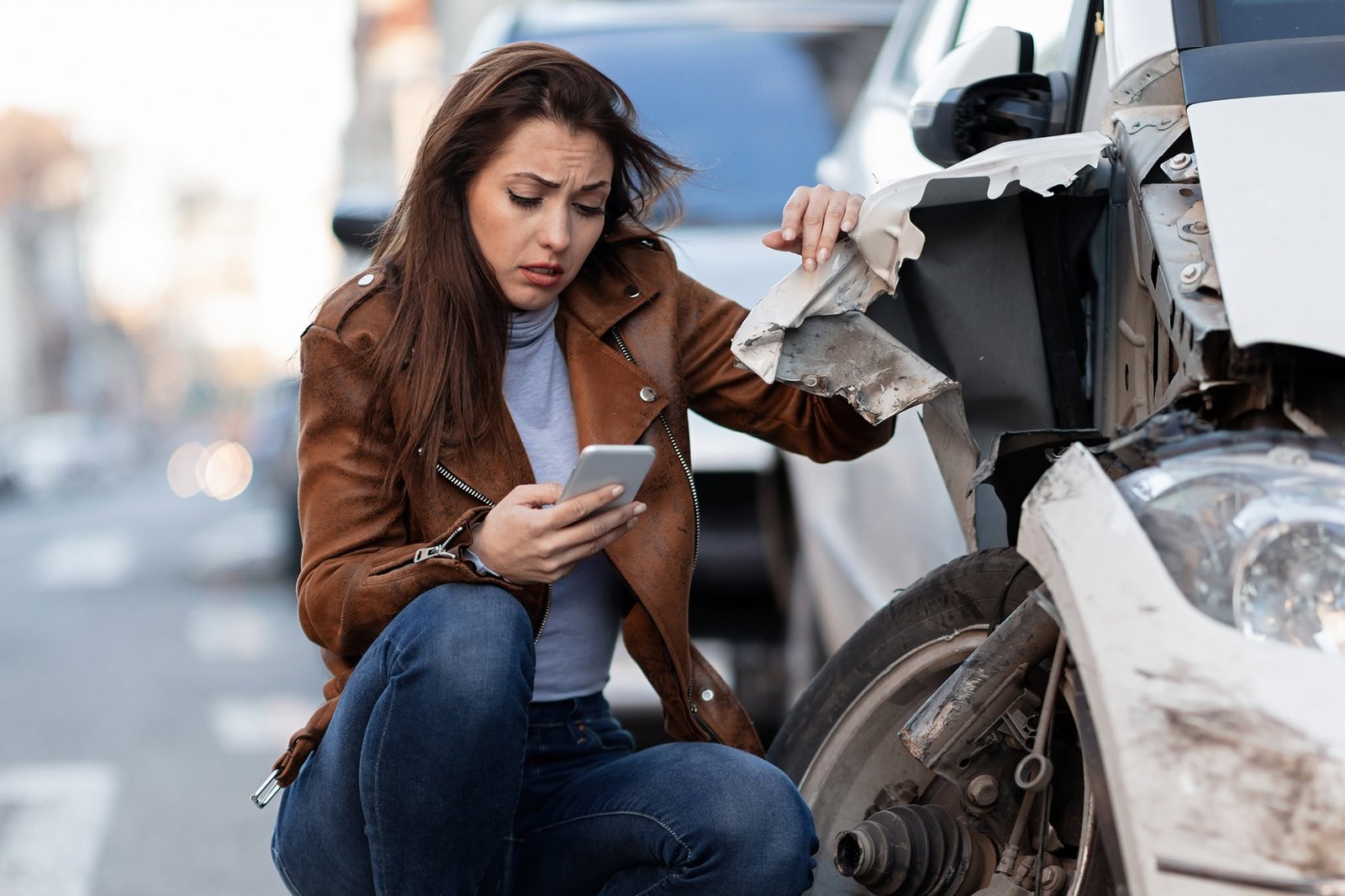Understanding Minor Car Accidents
Minor car accidents are typically characterized by low-speed collisions that result in minimal damage to vehicles and injuries to occupants. These incidents often include scenarios such as fender benders, where one vehicle gently taps another in a parking lot, or a slight rear-end collision occurring at a stoplight. These situations are usually straightforward, involving little to no physical harm to those involved, and often do not necessitate the intervention of police or emergency services.
Recognizing the difference between minor and major accidents is crucial for several reasons. Minor accidents usually involve less costly repairs, which can often be handled through insurance without raising premiums significantly. Conversely, major accidents may lead to extensive vehicle damage, serious injuries, or even fatalities, typically resulting in more complex insurance claims and legal ramifications. Therefore, understanding the nature of the accident can greatly influence how the situation is managed, both on-site and afterward.
Assessing the situation after a minor car accident is essential. Parties involved should first ensure their safety and that of others, checking for injuries and stabilizing their conditions if possible. Following this, it is important to gather pertinent information, such as the names and insurance details of all drivers, photographs of the damaged vehicles, and statements from any witnesses. Documentation plays a pivotal role in determining fault and organizing financial responsibilities under insurance policies, as well as addressing any tensions that may arise during the exchange of information.
Moreover, while many minor accidents may be resolved amicably, it is crucial not to underestimate their implications. Even minimal damage can lead to complications later, including hidden mechanical issues or delayed physical injuries. Thus, understanding the scope of the accident, and ensuring proper documentation, is vital for protecting oneself in any potential claims or disputes that may arise post-incident.
Stay Calm and Assess the Situation
Experiencing a minor car accident can be a distressing situation; however, maintaining composure is crucial. Keeping a level head can significantly influence how effectively you manage the aftermath of the incident. After ensuring that the vehicle has come to a complete stop, the first step is to take a deep breath and gather your thoughts.
Your immediate priority should be to assess the health and safety of all individuals involved in the accident. Check yourself first for any injuries, then check on any passengers, and finally, if possible, assess the condition of others involved in the incident. If someone appears seriously injured, it is essential to call emergency services right away. Remember, your personal safety is paramount; if the situation forces you to exit your vehicle on a busy road, do so cautiously.
Next, ensure that your car is in a safe location to prevent further accidents. If it is safe to do so, move your vehicle to the side of the road. This action prevents additional collisions and allows for smoother traffic flow. Before exiting your vehicle, turn on your hazard lights to alert other drivers to your presence. Taking these precautions helps create a safer environment while you assess the damage.
Now, turn your attention to evaluating the condition of the vehicles involved and the surrounding area. Document visible damages for both insurance claims and personal records. It is advisable to take photographs of the scene, detailing vehicle positions, damages, and any relevant road signs or markings. Collecting this information will provide a more comprehensive picture when filing an insurance claim or if disputes arise. Addressing these elements calmly and methodically can significantly impact the resolution process following a minor car accident.
Ensure Everyone’s Safety
In the aftermath of a minor car accident, the primary concern should always be the safety of all individuals involved. Immediately following the collision, assess the situation to determine if anyone is injured. If injuries are present, it is essential to remain calm and check on the wellbeing of passengers and drivers, prioritizing those who appear to be in need of assistance. If serious injuries are suspected, do not attempt to move individuals, as this may exacerbate their condition. Instead, focus on providing reassurance until emergency services arrive.
Utilizing hazard lights is another crucial step in ensuring safety at the accident scene. Activating your vehicle’s hazard lights signals to other drivers that there has been an incident ahead, prompting them to exercise caution and reduce their speed. This action not only protects your vehicle from potential further collisions, but also serves to alert other motorists to remain vigilant while navigating the area. Be sure to keep your hazard lights on until the situation has been resolved, and it is safe for vehicles to resume normal traffic flow.
When it becomes evident that emergency services are required, promptly call for assistance. When making the call, clearly articulate your location, describe the severity of any injuries, and provide any relevant details about the accident. This ensures that the appropriate help is dispatched quickly. Communication with other drivers involved is equally important; approach discussions about the accident calmly, exchanging information such as names, contact details, and insurance information. Discussing safety measures in a respectful manner can alleviate tensions, ensuring that everyone’s focus remains on resolving the situation effectively and safely.
Document the Accident Scene
Documenting the accident scene is a critical step in managing minor car accidents effectively. A thorough documentation process can significantly aid in resolving disputes and enhancing communication with insurance companies. Begin by capturing clear photographs of the accident scene from multiple angles. This should include images of both vehicles involved, the positions they are in, and any damage sustained. Additionally, take pictures of any relevant traffic signs, signals, or road conditions that may have contributed to the accident. These visual records can serve as vital evidence in determining liability.
Moreover, paying attention to details like weather conditions and visibility can provide context for understanding the incident better. You should also document the time and date of the accident, as these factors can be paramount in accident investigations. Following this, gathering witness statements is essential. If bystanders were present, politely ask them to provide their accounts of what happened. Collect their names, contact numbers, and, if possible, obtain any written statements that can corroborate your version of events. Witnesses often provide impartial perspectives that can aid your case.
In addition to witness information, it is crucial to collect pertinent details from the other drivers involved. This includes their names, contact information, and insurance details. Be sure to note the make and model of their vehicles, as well as their license plate numbers. All this information will be instrumental during the claims process and may assist should any legal disputes arise later on. Properly documenting every aspect of the incident can facilitate a smooth resolution, making it easier to assess damages and navigate the intricacies of insurance claims.
Report the Accident to the Authorities
When involved in a minor car accident, understanding the legal requirements for reporting the incident to local authorities is crucial. In many regions, it is mandatory to notify the police if there is significant property damage, injury, or if the other party lacks insurance. Even in cases deemed minor, it is prudent to contact the police to establish an official record of the incident. This documentation can be essential for insurance claims and any potential legal proceedings.
When reporting the accident, it is critical to provide specific information, including the time and location of the incident, the details of the vehicles involved, and any witness accounts. It is also advisable to mention whether there are any injuries or ongoing hazards, such as a blockage on the roadway. By supplying this information, the police can arrive at the scene equipped to manage the situation appropriately and record the necessary evidence.
Once the police have conducted their investigation, you will need to request a copy of the police report. This document will contain important details, including the officer’s observations, the parties involved, and the findings of the investigation. Obtaining this report can usually be done online, through a written request, or by visiting the local police department, depending on your jurisdiction’s regulations.
Failing to report a minor accident can lead to adverse consequences. Not only could you face penalties, including fines, but your insurance company may also question the legitimacy of any claims made without an official police report. Moreover, if disputes arise regarding liability, having a documented account from the authorities can provide clarity and support your case. Therefore, it is advisable to follow the proper reporting procedures after any car accident, regardless of its severity.
Contact Your Insurance Company
In the aftermath of a minor car accident, one of the first and most crucial steps to take is to contact your insurance company. Prompt notification is essential as it allows the insurer to begin the claims process and manage your coverage effectively. Most insurance policies require that you report an accident within a specific timeframe, often within 24 hours, to ensure that you remain eligible for benefits. Therefore, gathering your information before making this call is advisable to ensure a smooth conversation.
When preparing to contact your insurance company, have the following details on hand: your policy number, the time and date of the accident, location specifics, and the contact information of all parties involved, including witnesses, if any. You should also prepare an accurate description of how the accident occurred, including factors such as weather conditions and visibility. This information will facilitate a comprehensive understanding of the incident for the claims adjuster.
Once you are connected with a representative, explain the situation clearly and succinctly. Mention that it is a minor accident, as this will help the insurer determine the best way to assist you. They may guide you in what additional documentation is required. This may include photos of the vehicle damage, the police report if involved, and any medical records related to injuries sustained during the accident.
Your insurance company will also clarify your coverage details, such as whether you have collision or liability insurance, and how these affect your claim. Understanding these elements is key, as they impact the out-of-pocket expenses you may incur. Taking proactive steps in communicating with your insurance provider can significantly streamline the claims process, ensuring that you receive the support and compensation necessary following a minor car accident.
Evaluate Damage and Seek Repairs
After a minor car accident, one of the critical steps involves evaluating the damage sustained by your vehicle. Begin by conducting a thorough examination of both the exterior and interior of your car. Check for visible dents, scratches, and any misalignment that may not be immediately evident. It is essential to take your time during this assessment, as minor damages could lead to more significant issues if left unaddressed.
Once the initial evaluation is complete, determine whether the damage is something that can be handled independently or if it necessitates a professional assessment. Several minor repairs, such as small dents or scratches, may be possible to fix at home, while others might require specialized tools or expertise. If any components affect the safety or functionality of the vehicle—such as headlights, brakes, or steering—immediate professional evaluation is advisable.
For repairs requiring professional intervention, obtaining repair estimates is the next step. Contacting multiple auto repair shops can provide you with a range of prices and options. It is beneficial to get these estimates documented, as they will play a crucial role when filing an insurance claim. Ensure that the estimates detail the proposed work, parts needed, and the overall cost of repairs.
Insurance can significantly impact how you approach car repairs. If the damage costs exceed your deductible, filing a claim might be advantageous. However, consider whether your premium could increase as a result. Consulting your insurance company for guidance on their policies regarding repair costs can clarify your options. Remember, keeping a record of all communications and receipts related to the accident will aid in managing claims efficiently. Prompt action and careful evaluation will help ensure that your vehicle remains safe and functional following a minor car accident.
Know Your Rights and Responsibilities
Understanding your rights and responsibilities is crucial when involved in a minor car accident. Every driver has a legal obligation to operate their vehicle safely and adhere to traffic laws. In the event of an accident, the determination of liability – or who is at fault – plays a pivotal role in resolving claims related to property damage or injuries. The party deemed liable is typically responsible for covering the costs associated with the accident, which includes vehicle repairs and medical expenses for any injured parties.
Following a minor car accident, you should exchange information with the other driver, including names, contact details, insurance information, and vehicle license plate numbers. This information is essential for filing insurance claims and should be documented accurately. If there are witnesses to the incident, obtaining their contact information can also be beneficial, especially if disputes arise regarding the circumstances of the accident.
In situations where the other party is uncooperative, it may become necessary to involve law enforcement. A police report can serve as an impartial account of the accident and assist in clarifying liability. Furthermore, keeping detailed records such as photographs of the accident scene, diagrams, and written notes can be invaluable. These documents can serve as evidence in any potential disputes that may arise later.
Also, it is important to understand that individual state laws can influence the way accidents are handled. Each state has its own set of regulations, including comparative negligence rules, which determine how liability is shared among parties involved in an accident. Therefore, being familiar with local laws can help you navigate the aftermath of a minor car accident more effectively. To protect your rights and responsibilities, it may be wise to consult with legal or insurance professionals who can provide guidance tailored to your specific situation.
Post-Accident Considerations
Following a minor car accident, it is crucial to remain vigilant regarding both your health and the condition of your vehicle. Often, injuries sustained during seemingly minor collisions may not be immediately apparent. Symptoms of hidden injuries, such as whiplash, concussions, or internal injuries, can manifest hours or even days after the incident. Therefore, it is advisable to seek a comprehensive medical evaluation, especially if you experience any unusual sensations, pains, or changes in physical abilities.
In addition to monitoring physical health, one must also navigate the complex landscape of post-accident insurance processes. After a car accident, you are required to report the incident to your insurance provider, whether you are at fault or not. Collect necessary documents, including the police report, photographs of the accident scene, and witness statements, to facilitate the claims process. Understanding the specifics of your insurance policy is vital, as it will determine coverage for medical expenses and vehicle repairs. Keep meticulous records of all communications with your insurer to ensure a smooth resolution.
The aftermath of a minor car accident can also take a toll on psychological well-being. It is not uncommon to experience feelings of anxiety, stress, or even post-traumatic stress disorder (PTSD). Engaging in stress management techniques, such as deep breathing exercises, physical activity, or talking to a mental health professional, can significantly help in navigating these emotional responses. Maintaining a support network of friends and family during this time can also provide essential comfort and reassurance.
In conclusion, prioritizing health, adequately documenting the accident for insurance, and taking care of emotional wellness are all important steps to effectively manage the aftermath of a minor car accident.



